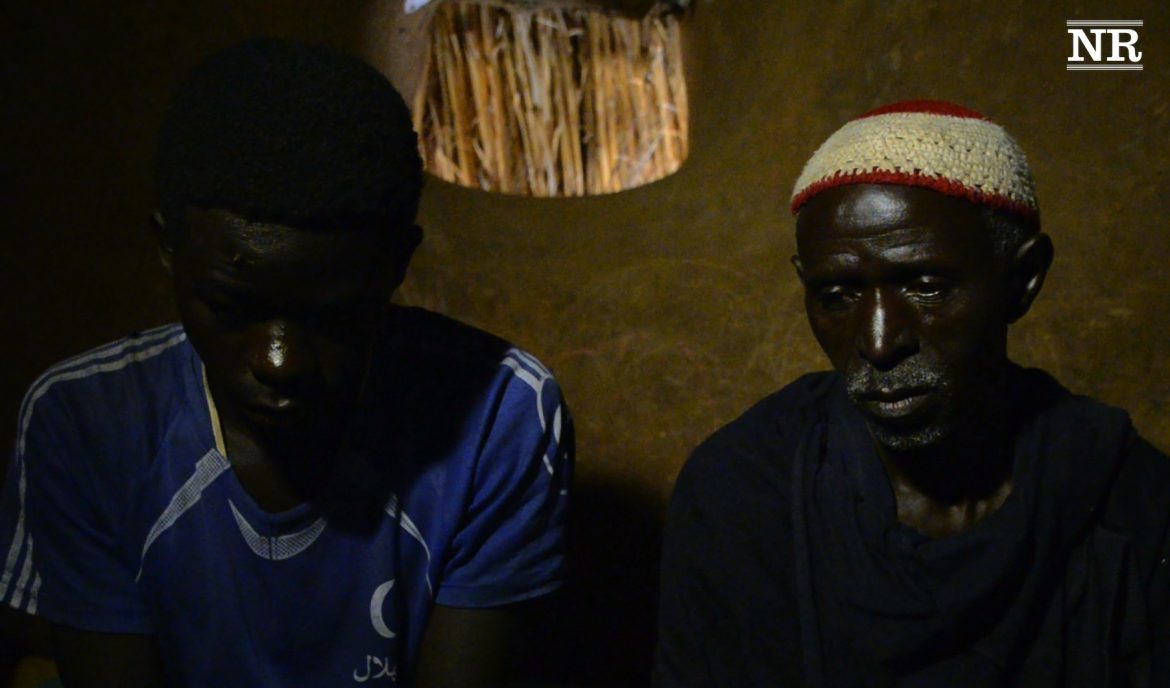Nuba Reports has obtained cell phone footage of uniformed men attacking and burning the village of Gardud al Badry, a small farming community in northeastern South Kordofan.
The video, shot on May 18th, 2012, is damning proof that the campaign of violence from Khartoum wages on against the people of Nuba.
Since July 2011, when fighting escalated between the SPLA-N and Khartoum forces, villages near the front lines, like Gardud al Badry, are often the victim.
Sudan’s Central Reserve Police, known as Abu Tira, a force renowned for cruel tactics, are clearly identified for the first time in video footage. During the attack, a coalition of soldiers from Abu Tira, Popular Defense Force (PDF), and Sudan Armed Forces (SAF) kidnapped four men, among them, a young student named Naim, 18. He was arrested on fabricated charges and forced confessions and taken to Al Abassiya prison where he was beaten and tortured for ten days.
Nuba Reports journalists travelled through war-torn communities of South Kordofan to meet with residents of Gardud al Badry and hear Naim’s story. They walked for four days to the remote village, passing destroyed and abandoned villages on the way. For ten more days, they walked gathering evidence from the former homesteads. The journalists saw eight destroyed villages, a trail of violence left behind as the soldiers of Omar al-Bashir’s army move through communities on the battle lines of this conflict.
Our reporters arrived August 1st, three days after the SAF attacked Gardud al Badry yet again.
Naim told Nuba Reports that he was awoken by the heat of his house burning. The soldiers seized him and bound him with rope. They accused Naim of planting mines for the SPLA-N, despite his student identification card proving his status at Jazeera Secondary School in Al Abassiya. In a barrage of death threats and questions, Naim agreed to the charges to avoid further beatings.
In the video, we hear the soldiers debate whether to shoot him on the spot, “Get information from him, then kill him,” one soldier is heard saying. Another voice says, “He doesn’t know anything. He’s nothing.”
Naim was detained for ten days amidst his family’s mounting anxiety. His father, Mohammed, received word that Naim was in Al Abassiya and set off to find him. “We spent many days looking for him,” he told Nuba Reports, “without food, without drink, and without enough sleep. We were all looking for him.”
Through days of bureaucratic failures, corruption, false accusations, and high-cost ransoms, he pursued his son’s release. “[T]his is my true son; if he died the whole mountain will cry for him,” he said. “We are innocent and weaponless people, all we are concerned about is getting the meal of the day.”
In Al Abassiya, Mohammed met resistance from security officers. According to Mohammed, one of the officers told him “I swear to God, you can take him [Naim] as a dead body, but alive, no way.” Only when he negotiated with the men who burned his village and kidnapped his child, was Mohammed able to obtain Naim’s release. Fareed, a leader of the PDF in Souq Algabal signed as guarantor, releasing Naim as an innocent student.
The incident in Gardud al Badry is one of many efforts to terrorize civilians in a region accused of opposing al-Bashir’s ruling government. The self-proclaimed “Match Battalion,” a coalition of PDF and SAF soldiers, filmed themselves setting fire to the village of Um Bartumbu in late 2011.
Residents of other villages in the region have witnessed Sudan government soldiers burning their homes. Angolo, Buram, Tess, Abu Hassan, Sara Fi, Jimizia, Delami, Mugalam, Lahamar, Tolodi Nuba are a few villages recently attacked or burned. This video provides proof that the Nuban people are the target of state-sanctioned attacks based on their ethnicity and political identification.
The violent conflict continues between SPLA-N and Sudan government forces and it is the civilians and their lands that suffer. As the village of Gardud al Badry burns in the background of the video, we hear a soldier proclaim, “With this flame, we extinguish the burning sedition in South Kordofan.”





